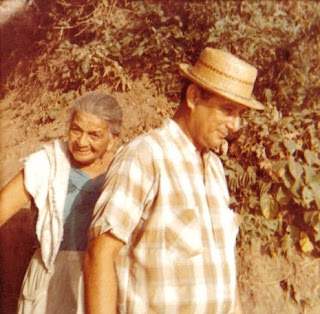
Februaries have always been good to me. Not that I've ever been particularly fond of blanket statements but there you have it: as far as months go, Februaries have always been good to me.
Let's see.
My mother was born on a February (how much credit should I take for that making it a good-for-me-month it's debatable, but read on.)
It is also the birth month for the youngest of my three children: coincidentally perhaps, born one day shy of the date, eight years before, when I first saw the brightest and prettiest eyes that once loved me the most, her mother’s.
February is when the attack happened.
I’ve always thought of it as the month of rebirth for my second child, barely a few weeks over seven months old when the two gunmen came to the house.
One of them snatched the baby off the nanny's arms, pushed the teenager to the ground, kicked the front door wide open and —shielding himself, perhaps, with the tiny body— joined his companion in shooting the place.
"Afterwards, my father cried like a baby," my wife later said. The gunmen had carried out the obviously intimidatory attack unaware that he was inside the house, and armed with a snub-nosed .38.
He had been unaware that one of the attackers was shielding himself with the baby. In finding that out later, he couldn't bear the thought that in shooting back, he had risked harming her, not the gunmen.
Those are some of the reasons why Februaries have been good to me. Optimist that I am, I'd probably say the same for any other month.
After all, it's not only Februaries where, once the event is gone, you realize that life’s still around just because something that's not precisely definable prevented things that would have put you in harm's way.
Roll back to just a few weeks before the attack, in November.
Early in the morning on a slow day for news, we are invited to join friends on a trip to Guatemala. The invitation's actually for my bureau chief, who's to meet his brother returning from a private visit to the United States. He inquires if I can tag along and the answer is yes.
Departure time: “We’ll let you know,” he is told, with the understanding that we’ll probably be boarding sometime in mid-afternoon or early evening.
This is the era before cellular telephony and though portable (car-mounted) phones and radios were already in use, neither one is available to us. Time passes, and as lunch time approaches, we board my friend's old VW microbus.
He’ll drop me home and we'll both be back at the office in the afternoon to take care of whatever news develops, and also wait for the phone call to head to the airport.
As luck would have it, some unexpected traffic jam diverts us from our usual route to the Boulevard de los Héroes, for many years now bustling with shops, cafes and restaurants with outdoor terraces.
As we past Manolo's just across the median, I tell my friend, "Let's stop for a bite." The u-turn is just a couple of blocks away. As we approach it, my friend asks: “What if they call?” He answers himself: “Nah, they said departure time mid-afternoon, let’s go.”
So we stop at Manolo's and 'a bite' turns into a rather moderately long lunch, ice-cold beer poured into frosty mugs to help us both wash down the food.
We finally make it home. Because it’s not too far away from his, I walk to the house I am heading to and as soon as I enter, the phone rings: “They called. Take-off is about now, think we can make it?” my friend asks. “Call them and find out," I say.
He does, but it’s too late. I usually make fun of the manner in which we in my native country usually reply to queries of, “Are they still there?” The answer will invariably be, “Acaban de salir, si se apura los alcanza.” (They just left, if you hurry up you’ll catch up with them not too far away.)
Most likely, the “just left” happened long ago enough for the people you are looking for to have returned.
Not this time, though.
On approach to the Guatemalan capital national airport, the plane crashes and our friends, all of our friends on board, are killed.
It’s hard to think of the disaster as an accident, given the experience and skill of the pilot. At the same time difficult to pinpoint as the product of sabotage. And if that was the case, were we, my colleague and I, also targets of the attack?
Can’t answer that, I fear. Whatever the answer may be, for me one thing it’s clear: goodness or kindness is not, should not be attributable to months.
So hear or read my introductory assertion as God has always been good to me in Februaries, always good no matter what the month, day or year.
I probably don't deserve it but hey, who am I to buck His will?


























.jpg)
.jpg)








